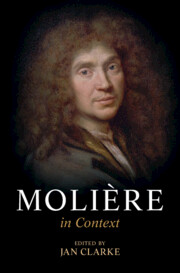Book contents
- Molière in Context
- Molière in Context
- Copyright page
- Dedication
- Contents
- Figures
- Charts and Tables
- Contributors
- Acknowledgements
- Translations
- Abbreviations
- Biographical Preface
- Part I Socio-Political Context
- Chapter 1 A Bourgeois at Court
- Chapter 2 The Religious Climate
- Chapter 3 Medicine
- Chapter 4 Family Law
- Chapter 5 Women
- Chapter 6 Gender, Masculinity and Cross-Dressing
- Part II Intellectual and Artistic Context
- Part III Theatrical Context (Paris)
- Part IV Theatrical Context (Court)
- Part V Reception and Dissemination
- Part VI Afterlives
- Further Reading
- Index
Chapter 4 - Family Law
from Part I - Socio-Political Context
Published online by Cambridge University Press: 10 November 2022
- Molière in Context
- Molière in Context
- Copyright page
- Dedication
- Contents
- Figures
- Charts and Tables
- Contributors
- Acknowledgements
- Translations
- Abbreviations
- Biographical Preface
- Part I Socio-Political Context
- Chapter 1 A Bourgeois at Court
- Chapter 2 The Religious Climate
- Chapter 3 Medicine
- Chapter 4 Family Law
- Chapter 5 Women
- Chapter 6 Gender, Masculinity and Cross-Dressing
- Part II Intellectual and Artistic Context
- Part III Theatrical Context (Paris)
- Part IV Theatrical Context (Court)
- Part V Reception and Dissemination
- Part VI Afterlives
- Further Reading
- Index
Summary
Molière’s depiction of marriage and the struggle between parents and children over the choice of a spouse uses the framework of civil law to shape his treatment of the comedy in these quarrels. While Molière explores human folly to drive the action in plays such as Le Bourgeois gentilhomme and L’École des femmes, legal requirements for arranging a valid marriage in early modern France also form part of these stories. Only the Catholic Church could declare a marriage valid, but the French monarchy promulgated laws giving fathers the right to punish disobedient children with penalties ranging from disinheritance to criminal charges. However, Moliere’s works mock the men entrusted with this power, showing them to be vain and superficial patriarchs who seek partners that will elevate family status rather than providing for the happiness of their children. Mothers and servants step in to undermine these foolish plans and help children marry for love and happiness rather than social concerns. Despite their subordinate roles in their families and in French society, these figures understand how to get round the requirements of French law and the wishes of men to conclude happy partnerships for the young people in their midst.
- Type
- Chapter
- Information
- Molière in Context , pp. 45 - 51Publisher: Cambridge University PressPrint publication year: 2022



